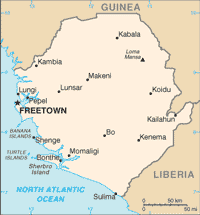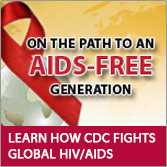Sierra Leone
HIV/AIDS in Sierra Leone
- 1.6% Estimated Prevalence
(Age 15–49) - 2,800 Estimated Deaths (2009)
- 15,000 Estimated Orphans
- 3,660 Reported Number of People Receiving ART
- 20,000 Estimated Number of People Needing ART
SOURCE:
UNAIDS Report on the Global AIDS Epidemic, November 2010

HIV/AIDS Assets and Strategic Focus
Strategic Focus
CDC has no in-country presence in Sierra Leone. All CDC support to the country is coordinated from headquarters in Atlanta. Currently, two cooperative agreements, awarded to the Association of Public Health Laboratories (APHL) and the American Society of Clinical Pathology support activities in-country.
Strengthening Public Health Laboratory Systems
The CDC’s International Laboratory Branch (ILB) is helping to establish a national reference laboratory (NRL) for infectious disease in-country – a first for Sierra Leone. With President's Emergency Plan for AIDS Relief (PEPFAR) funds, the CDC, in conjunction with the Global Fund, World Health Organization (WHO), United Nations Children's Fund (UNICEF), and the APHL collaborated in the development of a national laboratory policy and strategic plan.
In early 2011, the Sierra Leone MoHS Laboratory Services Unit and the National AIDS Secretariat (NAS) completed converting an HIV Reference Laboratory into a National Infectious Disease Public Health Laboratory that will offer serology, molecular diagnostics, and microbiology public health services. The MoHS is validating a five-year strategic plan aimed at developing an organizational structure for the national laboratory system.
Strengthening Monitoring and Evaluation
CDC conducted a pre-pilot evaluation to assess infrastructure, systems, and potentials for integration into the existing maternal and child health program and will develop guidelines to conduct an expanded pilot.
Notable Accomplishments
CDC developed strong partnerships with NAS, MoHS, WHO, UNICEF, the Department of Defense, and the United States Agency for International Development , which has led to the establishment of an MoHS-led laboratory and surveillance technical workgroup, the development of a national laboratory strategic plan, and an MoHS-approved national laboratory policy.
CDC provided support and technical expertise in the expansion of the antenatal surveillance survey from 13 to 20 sentinel sites.
The CDC’s Field Epidemiology Laboratory Training Program based in Ghana, has trained 50 in-country district health officers in basic epidemiology and outbreak investigation. The surveillance workforce team has also been instrumental in the development of a comprehensive national disease surveillance strategic plan to guide all disease surveillance activities until 2016.
Contact Us:
- Centers for Disease Control and Prevention
1600 Clifton Rd
Atlanta, GA 30333 - 800-CDC-INFO
(800-232-4636)
TTY: (888) 232-6348
24 Hours/Every Day - cdcinfo@cdc.gov
 ShareCompartir
ShareCompartir



